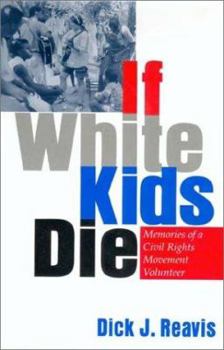If White Kids Die: Memories of a Civil Rights Movement Volunteer
Select Format
Select Condition 
Book Overview
The summer of 1964 had been "Freedom Summer" for a few campuses. The Student Non-Violent Co-Ordinating Committee (SNCC) had drawn some five hundred students, most of them white, from Ivy League and prestigious universities to help its integration efforts in Mississippi. An up-and-coming leader named Stokely Carmichael had told a group of prospective volunteers in New York that SNCC wanted to be sure that if blacks were killed for the civil rights cause, whites would die with them. What he said was prophetic, even if it wasn't popular. A few weeks after his speech, three young men--two white and one black--were murdered in Philadelphia, Mississippi. The nation was scandalized. While he wasn't aware of Carmichael's strategy when he decided to join a 1965 summer voter registration program, Dick J. Reavis felt it instinctively when he told his resistant father the reason he was going. "Dad, if we live in a country where nobody pays attention when Negroes die, then I guess that's the way it has to be. Somebody has to pay the price." The price the white middle-class Texan paid when he spent a summer on the wrong side of the tracks in Demopolis, Alabama, was his innocence. If White Kids Die describes his gradual maturation as he encountered the other side of legally enforced racism. Harassed by police for being in a white neighborhood with a black coworker, arrested for vagrancy, and prevented from driving by arcane residency laws, Reavis came to understand the frustration with "The System" that fueled the Civil Rights Movement. At the same time, he saw the infighting and strategizing within the Movement that prevented it from living up to his ideals. In the end, he concludes, "The System made some concessions to our protests, but its power was never trumped. . . . But history has not ended, and deep in my heart, I do believe that we--virtually the whole human race--will overcome someday."
Format:Hardcover
Language:English
ISBN:1574411292
ISBN13:9781574411294
Release Date:March 2001
Publisher:University of North Texas Press
Length:128 Pages
Weight:0.95 lbs.
Dimensions:0.6" x 6.2" x 9.4"
Related Subjects
HistoryCustomer Reviews
2 ratings
Facinating look at the civil rights movement
Published by Thriftbooks.com User , 15 years ago
What an amazing account of the civil rights movement from the point of view of a white civil rights worker. The buddy-view narration of one who was right there and knew all of the amazing leaders of the movement is easy to read and incredibly entertaining and informative. I am a very of Charlie Saulsburry, who is mentioned in this book, and the author, all these years later, absolutely pegged him. Great job!
A Moment in Time
Published by Thriftbooks.com User , 24 years ago
This book was recommended by a friend who is mentioned in the book. Otherwise I probably would not have bought it. However I found it easy to read and very enlightening. I graduated from high school in 1962 from a small town in the South. Although my path took me a different direction; I was fascinated by Dick Reavis' accounts of his experiences at voter registration in a small Southern town. He is certainly very honest in his portrayal of his contributions to the movement. Learning more about the struggles of the college students and the people in the city where they worked helped me have a better understanding of the issues they were trying to help change. I was very naive back then and quite frankly unaware of some of the restrictions that were imposed on African Americans at that time. Thanks for enlightening me. I intend to do more reading on this important chapter in American history.





